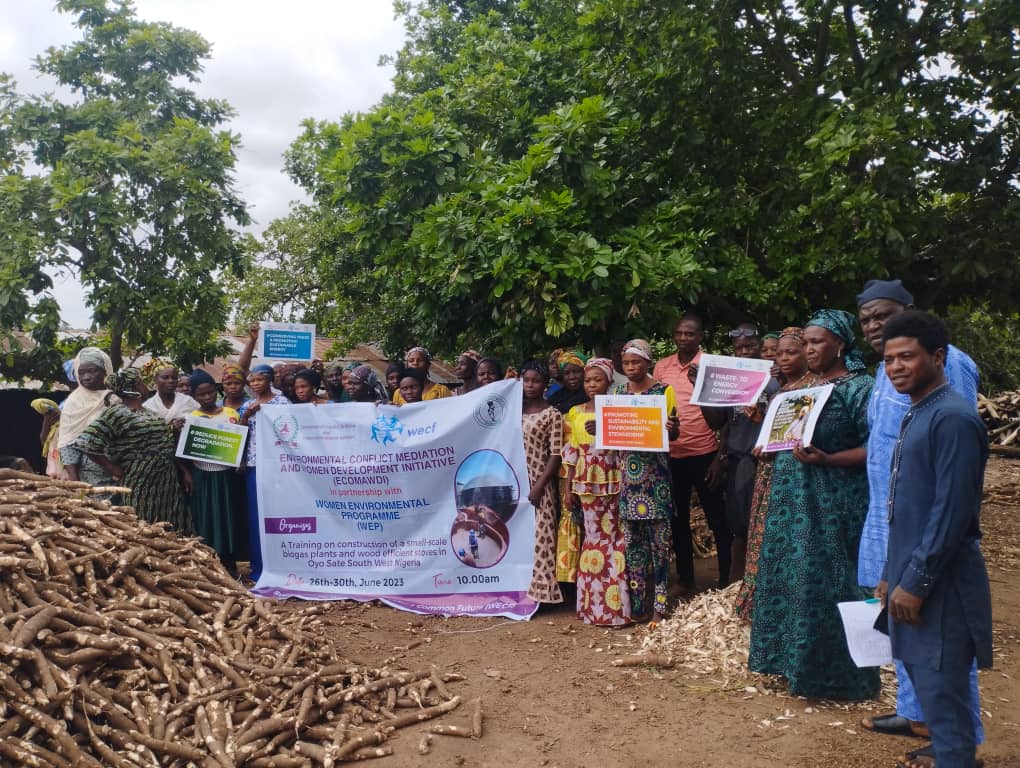
The Environmental Conflict Mediation and Women Development Initiative(ECOMAWDI), a Non Governmental Organisation(NGO) has called for the adoption of small scale biogas for garri processing in order to reduce adverse effects of climate change.
The Executive Director, ECOMAWDI, Mrs Ijeoma Ladele, made the call during a training on construction of biogas plants and wood efficient stoves for women in Irewolede Garri processing unit at Oyo town.
The News Agency of Nigeria(NAN) reports that the biogas training was organised in partnership with the Women Environmental Programme (WEP) sponsored by Women Engage for a Common Future (WECF).
Ladele said that the aim of the training was to promote sustainable environment management through women participation and also to reduce deforestation.
She added that the training sought to sensitise the women and men on the need to adopt generation of energy for their garri processing through a sustainable approach by using small scale biogas plants which could be achieved through clay bricks and cassava waste peels generated in the same environment and other sources waste within the community.
According to her, the NGOs was ready to assist the Irewole garri processing community in achieving cassava peel waste to energy without cutting down trees for firewood to ensure tree conservation and promotion of sustainable energy.
“This is the first phase of this project, we are here to assess the location, check availability of waste cassava peels for local biogas, the next phase will be project construction so as to generate clean energy for garri processing.
“Biogas energy will definitely reduce cutting of trees, reduce cost of production, promote good health and provide a more sustainable approach to source of energy, “she said.
Also speaking, the guest facilitator, Mr Almaroof Muhammad, the Coordinator, Peace Environment and Development Foundation(PEDEF), said that the training would expose the participants to the importance of good environment practices as regards production.
Muhammad added that the adverse effects that cutting down of trees has on the environment and its impact on climate change cannot be over emphasised.
“By this training, we want to make them more efficient in their garri production, we look forward to reducing production cost for them and at the same time looking after their health and wellness.
“It is a known fact that exposure to smoke over a longer time has its own adverse effects on their health, so with this small scale biogas training, they will have access to cleaner sources of energy.
“Women are major players in garri processing and they are vulnerable in terms of access to right information and technology, so this training is also a way of empowering them with right information on modern and cost effective ways of doing their garri production, “he said.
In her contribution, the Women leader, Irewole Garri processing unit, Oyo, Mrs Ronke Ojo, said that introduction of biogas technology into their business would remove a lot of stress that they experience in garri production.
Ojo noted that they always spend close to 30 to 40 thousand naira to get a load of pick up van of firewood for frying garri which shows that larger percentage of their gains goes to firewood.
Also speaking, the Chairman, Irewole Garri processing unit, Mr Taofeek Ahmed, lauded the NGOs for the training, he noted that the training was timely and resourceful.
The team also paid a courtesy visit to the traditional ruler of Isokun Land, Oyo, Chief Isiaka Tella (Ona Isokun) said that tree cutting has been a common practice in the community which has adversely affected the environment and support the sustainable approach to generating energy.
He called for strategic execution of the biogas initiative so that it would not lead to additional cost for the garri processor as this could make it difficult for them to embrace the project.
